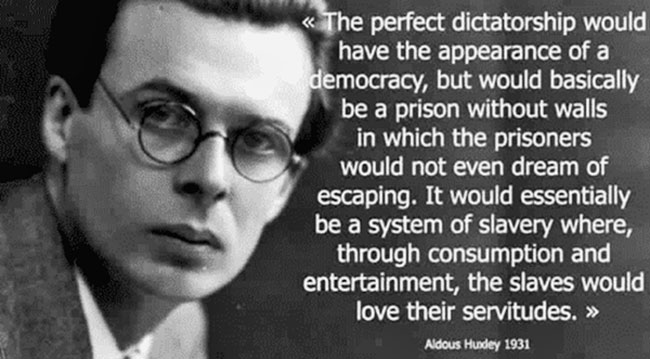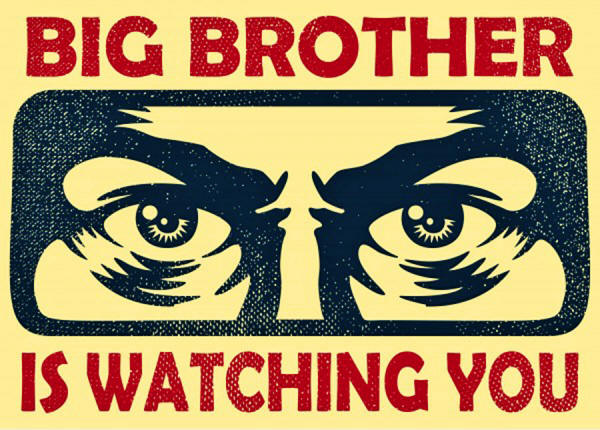|

by Colin Liddell
November 15,
2018
from
UNZ Website

The debate rages on as who which dystopian
future is preferable: Brave New World vs.
Nineteen-Eighty Four.
Technocracy leans toward Huxley but has elements
of both.
However, this is a dangerous dialectic because
it leaves out freedom and liberty in a
Constitutional Republic.
Source
Why Orwell is
Superior to Huxley
One of the frequent comparisons that comes up in the Dissident
Right is who was more correct or prescient, Orwell or
Huxley.
In fact, as the only truly oppressed intellectual group, the
Dissident Right are the only ones in a position to offer a valid
opinion on this, as no other group of intellectuals suffers
deplatforming, doxxing, and dismissal from jobs as much as we do.
In the present day, it is
only the Dissident Right that exists in the 'tyrannical
space' explored in those two dystopian classics.
But, despite this, this debate exists not only on the Dissident
Right but further afield. Believe it or not, even Left-wingers
and Liberals debate this question, as if they too are under the heel
of the oppressor's jackboot.
In fact, they feel so
oppressed that some of them are even driven to discuss it in the
pages of the New York Times at the despotically high rate of
pay which that no doubt involves.
In both the Left and the Dissident Right, the consensus is that
Huxley is far superior to Orwell, although, according to the New
York Times article just alluded to, Orwell has caught up a lot
since the election of
Donald Trump.
Have a look at this
laughable, "I'm literally shaking" prose from New York Times
writer Charles McGrath:
And yet [Huxley's]
novel much more accurately evokes the country we live in now,
especially in its depiction of a culture preoccupied with sex
and mindless pop entertainment, than does Orwell's more ominous
book, which seems to be imagining someplace like North Korea.
Or it did until
Donald Trump was inaugurated...
All of a sudden, as many commentators have pointed out, there
were almost daily echoes of Orwell in the news…
The most obvious
connection to Orwell was the new president's repeated insistence
that even his most pointless and transparent lies were in fact
true, and then his adviser Kellyanne Conway's explanation that
these statements were not really falsehoods but, rather,
"alternative facts."
As any reader of "1984"
knows, this is exactly Big Brother's standard of truth:
The facts are
whatever the leader says they are...
…those endless wars
in "1984," during which the enemy keeps changing - now Eurasia,
now Eastasia - no longer seem as far-fetched as they once did,
and neither do the book's organized hate rallies, in which the
citizenry works itself into a frenzy against nameless
foreigners.
The counter to this is
that Trump is the only non-establishment candidate to get elected
President since Andrew Jackson and therefore almost the exact
opposite of the idea of top-down tyranny.
But to return to the notion that Huxley is superior to Orwell,
both on the Left and the Dissident Right, this is based on a common
view that Huxley presents a much more subtle, nuanced, and
sophisticated view of soft tyranny more in keeping
with the appearance of our own age.
Here's McGrath
summarizing this viewpoint, which could just as easily have come out
of the mouth of an Alt-Righter, Alt-Liter, or Affirmative Righter:
Orwell didn't really
have much feel for the future, which to his mind was just
another version of the present.
His imagined London
is merely a drabber, more joyless version of the city, still
recovering from the Blitz, where he was living in the mid-1940s,
just before beginning the novel.
The main
technological advancement there is the two-way telescreen,
essentially an electronic peephole.
Huxley, on the other hand, writing almost two decades earlier
than Orwell (his former Eton pupil, as it happened), foresaw,
-
a world that
included space travel
-
private
helicopters
-
genetically
engineered test tube babies
-
enhanced
birth control
-
an immensely
popular drug that appears to combine the best features
of Valium and Ecstasy
-
hormone-laced
chewing gum that seems to work the way Viagra does
-
a full
sensory entertainment system that outdoes IMAX
-
maybe even
breast implants
(The book is a little
unclear on this point, but in "Brave
New World" the highest compliment you can pay a woman
is to call her "pneumatic.")
Huxley was not entirely serious about this.
He began "Brave New
World" as a parody of H.G. Wells, whose writing he detested, and
it remained a book that means to be as playful as it is
prophetic.
And yet his novel
much more accurately evokes the country we live in now,
especially in its depiction of a culture preoccupied with sex
and mindless pop entertainment, than does Orwell's more ominous
book, which seems to be imagining someplace like North Korea.
It is easy to see why
some might see Huxley as more relevant to the reality around us than
Orwell, because basically "Big Brother," in the guise of the Soviet
Union, lost the Cold War, or so it seems.
But while initially convincing, the case for Huxley's superiority
can be dismantled.
Most importantly, Huxley's main insight, namely that control can be
maintained more effectively through,
"entertainment,
distraction, and superficial pleasure rather than through overt
modes of policing and strict control over food supplies" is not
actually absent in 1984.
In fact, exactly these
kind of methods are used to control the Proles, on whom
pornography is pushed and prostitution allowed.
In fact porn is such an
important means of social control that the IngSoc authorities
even have a pornography section called "PornSec," which mass
produces porn for the Proles.
One of the LOL moments in
Michael Radford's film version is when Mr. Charrington, the
agent of the thought police who poses as a kindly pawnbroker to rent
a room to Winston and Julia for their sexual trysts, informs them on
their arrest that their surveillance film will be 'repurposed' as
porn.
In fact, Orwell's view of sex as a means of control is much more
dialectical and sophisticated than Huxley's, as the latter was, as
mentioned above, essentially writing a parody of the naive "free
love" notions of H.G. Wells.
While sex is used as a means to weaken the Proles, 'anti-Sex'
is used to strengthen the hive-mind of Party members. Indeed, we see
today how the most hysterical elements of the Left - and to a
certain degree the Dissident Right - are the most undersexed.
Also addictive substances are not absent from Orwell's dystopian
vision.
While
Brave New World only has soma,
1984 has Victory Gin, Victory
Wine, Victory Beer, Victory Coffee, and Victory Tobacco -
all highly addictive substances that affect people's moods and
reconcile them to unpleasant realities.
Winston himself is
something of a cigarette junkie and gin fiend, as we see in this
quote from the final chapter:
The Chestnut Tree
was almost empty.
A ray of sunlight
slanting through a window fell on dusty table-tops. It was the
lonely hour of fifteen. A tinny music trickled from the
telescreens.
Winston sat in his usual corner, gazing into an empty glass. Now
and again he glanced up at a vast face which eyed him from the
opposite wall.
BIG BROTHER IS
WATCHING YOU, the caption said.
Unbidden, a waiter
came and filled his glass up with Victory Gin, shaking into it a
few drops from another bottle with a quill through the cork.
It was saccharine
flavored with cloves, the specialty of the cafe…
In these days he could never fix his mind on any one subject for
more than a few moments at a time. He picked up his glass and
drained it at a gulp.

But while 1984
includes almost everything that Brave New World contains in
terms of controlling people through sex, drugs, and
distractions, it also includes much, much more, especially regarding
how censorship and language are used to control people and how
tyranny is internalized.
The chapter from which
the above quote comes, shows how Winston, a formerly autonomous
agent, has come to accept the power of the system so much that he no
longer needs policing.
But most brilliant of all is Orwell's prescient description of how
language is changed through banning certain words and the expression
of certain ideas or observations deemed "thought crime," to say
nothing of the constant rewriting of history.
The activities of Big
Tech and their deplatforming of all who use words, phrases, and
ideas not in the latest edition of their "Newspeak" dictionary, have
radically changed the way that people communicate and what they talk
about in a comparatively short period of time.
Orwell's insights into how language can be manipulated into a tool
of control shows his much deeper understanding of human psychology
than that evident in Huxley's novel.
The same can be said
about Orwell's treatment of emotions, which is another aspect of his
novel that rings particularly true today.
In 1984 hate figures, like Emmanuel Goldstein,
and fake enemies, like Eastasia and Eurasia, are used
to unite, mobilize, and control certain groups.
Orwell was well aware of
the group-psychological dynamics of the tribe projected to the
largest scale of a totalitarian empire.
The concept of "three
minutes hate" has so much resonance with our own age, where
triggered Twitter-borne hordes of SJWs and others slosh around the
news cycle like emotional zombies, railing against Trump or
George Soros.
In Huxley's book, there are different classes but this is not a
source of conflict.
Indeed they are so
clearly defined - in fact biologically so - that there is no
conflict between them, as each class carries out its predetermined
role like harmonious orbit of Aristotelian spheres.
In short, Brave New World sees man as he likes to see himself
- a rational actor, controlling his world and taking his pleasures.
It is essentially the vision of a well-heeled member of the British
upper classes.
Orwell's book, by contrast, sees man as the tribal primitive, forced
to live on a scale of social organization far beyond his natural
capacity, and thereby distorted into a mad and cruel creature.
It is essentially the
vision of a not-so-well-heeled member of the British middle classes
in daily contact with the working class.
But is all the richer and
more profound for it...
|



